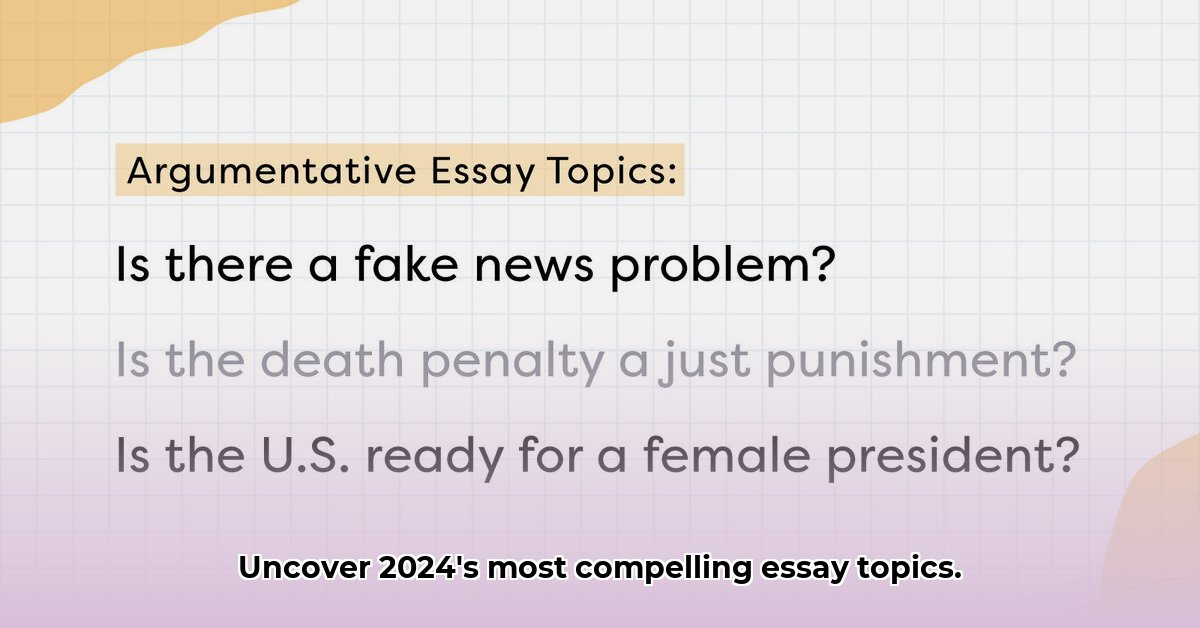Picking a topic for your argumentative essay can feel overwhelming, but it doesn’t have to be! This article provides a wealth of compelling ideas, ideally suited for high school and college students alike. From hotly debated subjects that are guaranteed to spark conversation to accessible topics that are nonetheless engaging, you’ll find an option that suits your interests and skill level. The topics are thoughtfully organized into sections for effortless browsing, and you’ll also find helpful tips to guide you in crafting a top-notch essay. So, let’s discover the perfect topic and begin your writing journey!
Argumentative Essay Topics: Research-Ready Prompts for 2024
(Compelling Ideas and Current Trends)
Eager to write a captivating essay? This comprehensive list presents a diverse array of argumentative essay topics tailored for high school and college students in 2024. These topics are carefully selected to encourage critical thinking and stimulate engaging debates. Let’s dive in.
Societal Issues: The Big Picture
(Exploring Complex Contemporary Challenges)
This section addresses pressing issues that significantly impact our world today. Their inherent complexity makes them ideal for thought-provoking argumentative essays.
Social Media’s Impact on Mental Well-being: Does constant connectivity enhance our lives, or does it negatively affect our mental health? Explore the evidence and diverse perspectives surrounding this pervasive issue.
The Ethics of Artificial Intelligence (AI) Development and Deployment: As AI technology becomes increasingly sophisticated, how can we ensure its ethical use and prevent potential harm? Examine the ethical considerations and propose solutions for responsible AI implementation. Some argue for strict regulations, while others advocate for a more laissez-faire approach.
Gun Control and Public Safety: What are the most effective strategies for reducing gun violence while respecting the rights of law-abiding citizens? Analyze the complexities of gun control and propose balanced solutions. This involves navigating different perspectives on the Second Amendment and considering research on the relationship between gun laws and crime rates.
Climate Change Mitigation and Economic Growth: What are the economic implications of addressing climate change, and what are the potential costs of inaction? Evaluate the economic arguments for and against climate action, considering the long-term consequences. Ongoing research explores the economic impacts of various mitigation and adaptation strategies.
The Future of Work: Automation and the Human Workforce: Will automation lead to widespread job displacement, or will it create new employment opportunities? Analyze the potential impact of automation on different sectors of the economy and consider strategies for workforce adaptation. This topic requires considering the varying impacts on different job types, technological advancements, and the ability of the workforce to adapt.
Income Inequality and Government Intervention: To what extent should governments intervene to address income inequality? Evaluate the effectiveness of different policy approaches and consider their potential consequences. Governments worldwide adopt a variety of approaches, each with its proponents and detractors. The effectiveness of these strategies is an ongoing subject of academic study.
Technology & Science: Innovation and its Ripple Effects
(Examining Cutting-Edge Developments and Their Consequences)
This section delves into the transformative advancements in technology and science and explores their far-reaching consequences, offering fertile ground for argumentative essays.
Genetic Engineering: Ethical Boundaries and Societal Impact: What are the ethical implications of genetic engineering, and how should we regulate its use? Weigh the potential benefits and risks of this rapidly advancing technology. This field is constantly evolving, with new information and ethical dilemmas emerging regularly.
Climate Change and Ecosystem Disruption: What are the far-reaching consequences of climate change on global ecosystems, and what measures can be taken to mitigate these effects? Explore the impacts of climate change on biodiversity, ecosystem stability, and human well-being. Current research suggests widespread and potentially devastating consequences.
Self-Driving Cars: Liability and Accountability: In the event of an accident involving a self-driving car, who should be held responsible? Investigate the legal and ethical complexities surrounding autonomous vehicle technology. This rapidly developing field requires careful consideration of liability, software design, and regulatory frameworks.
Technology Integration in Education: Enhancing or Hindering Learning Outcomes?: To what extent does technology enhance or detract from the educational experience? Analyze the impact of technology on student learning, engagement, and development. Research suggests that some technologies can be beneficial, while others may be detrimental to learning outcomes.
Big Data and Privacy Concerns: How can we protect individual privacy in an era of ubiquitous data collection? Explore the ethical and legal challenges associated with big data and propose solutions for responsible data management. This balancing act requires navigating complex trade-offs between innovation and individual rights.
Space Exploration: Justification of Costs and Benefits: Is continued investment in space exploration a worthwhile endeavor, or should resources be prioritized for pressing issues on Earth? Weigh the potential scientific, economic, and societal benefits of space exploration against the costs involved. Strong arguments exist on both sides, reflecting differing priorities and values.
Politics & Government: Power Plays and Public Policy
(Analyzing Governance, Legislation, and Societal Impact)
This section examines the inner workings of government and explores its impact on society, providing a platform for insightful argumentative essays.
Healthcare Access: A Universal Right or a Market Commodity?: Should healthcare be guaranteed as a fundamental right for all citizens, or should it be primarily provided through a market-based system? Compare and contrast different healthcare models, considering issues of access, affordability, and quality. Many countries have adopted various models, each with its own strengths and weaknesses.
Campaign Finance Reform: Regulating Political Influence: How can campaign finance regulations be reformed to reduce the influence of money in politics? Evaluate different approaches to campaign finance and consider their potential impact on electoral outcomes. Campaign finance reform is a complex area with debates about freedom of speech and fair representation.
Lobbying and Political Representation: Does lobbying provide a valuable avenue for interest groups to advocate for their concerns, or does it distort the political process? Examine the role of lobbying in shaping public policy and consider potential reforms. There’s ongoing debate about whether lobbying is a necessary part of democracy or an undue influence.
International Organizations: Effectiveness and Accountability: Do international organizations like the United Nations effectively address global challenges, or are they hampered by bureaucratic inefficiencies and political constraints? Evaluate the role and impact of international organizations in promoting peace, security, and development. Their effectiveness varies depending on the specific circumstances and mandates.
Electoral System Design: Ensuring Fair Representation: What are the most effective electoral systems for ensuring fair and representative government? Compare and contrast different electoral systems, considering issues of voter turnout, proportionality, and political stability. Different systems offer diverse advantages and disadvantages, sparking ongoing debates about fairness and representation.
Education & Society: Building the Future
(Investigating the Foundations of Learning and Social Progress)
This section explores the role of education in shaping society and offers opportunities to examine strategies for improving educational systems.
Standardized Testing: Validity and Reliability as Assessment Tools: Are standardized tests a reliable and valid measure of student learning and achievement? Analyze the strengths and weaknesses of standardized testing and consider alternative assessment methods. The role and effectiveness of standardized tests remain a contentious issue in education.
Homeschooling vs. Public Schooling: Comparative Advantages and Disadvantages: What are the relative benefits and drawbacks of homeschooling and public schooling? Compare and contrast the two educational models, considering factors such as academic outcomes, socialization, and parental involvement. The debate often considers factors like socialization, curriculum flexibility, and academic outcomes.
Early Childhood Education: Long-Term Impact and Accessibility: Does early childhood education have a lasting impact on children’s development and future success? Explore the benefits of early childhood education and consider strategies for expanding access to quality programs. Research suggests many positive correlations between quality early childhood education and long-term outcomes.
Equitable Access to Education: Addressing Achievement Gaps: What measures can be taken to ensure that all students, regardless of their socioeconomic background, have access to quality education and opportunities for success? This is a key issue for achieving social and economic equity.
This curated list serves as a springboard for your argumentative essay endeavors. Select a topic that resonates with you, conduct thorough research (with proper citations), and craft a compelling argument. Remember, a well-researched and logically sound argument is a powerful tool for persuasion.
How to Choose the Best Argumentative Essay Topic for High School
(Practical Steps and Considerations for Topic Selection)
Key Takeaways:
- Understanding the nuances of how to choose the best argumentative essay topic for high school is crucial for success.
- A compelling topic sparks your interest and allows for in-depth research.
- Consider your existing knowledge and research capabilities.
Finding the Perfect Argumentative Essay Topic: A Step-by-Step Guide
(Essential Techniques for Successful Topic Selection)
Selecting the right topic is a crucial first step. It involves discovering the ideal balance between your personal interests and your capacity to conduct research and construct a persuasive argument. Here’s how to approach the topic selection process:
Step 1: Brainstorming and Exploration
Begin by brainstorming a wide range of potential topics. Reflect on current events, societal issues, or even personal experiences that have ignited strong opinions within you. Every subject is a possibility – politics, technology, social media, the environment, etc. Record every idea that comes to mind without censoring yourself.
Step 2: Narrowing Your Focus
Your initial concepts might be too broad in scope. “Climate change,” for example, is a vast subject. Try to narrow it down to a more manageable focus. A more focused topic such as, “The effectiveness of carbon taxes in mitigating climate change” allows for










